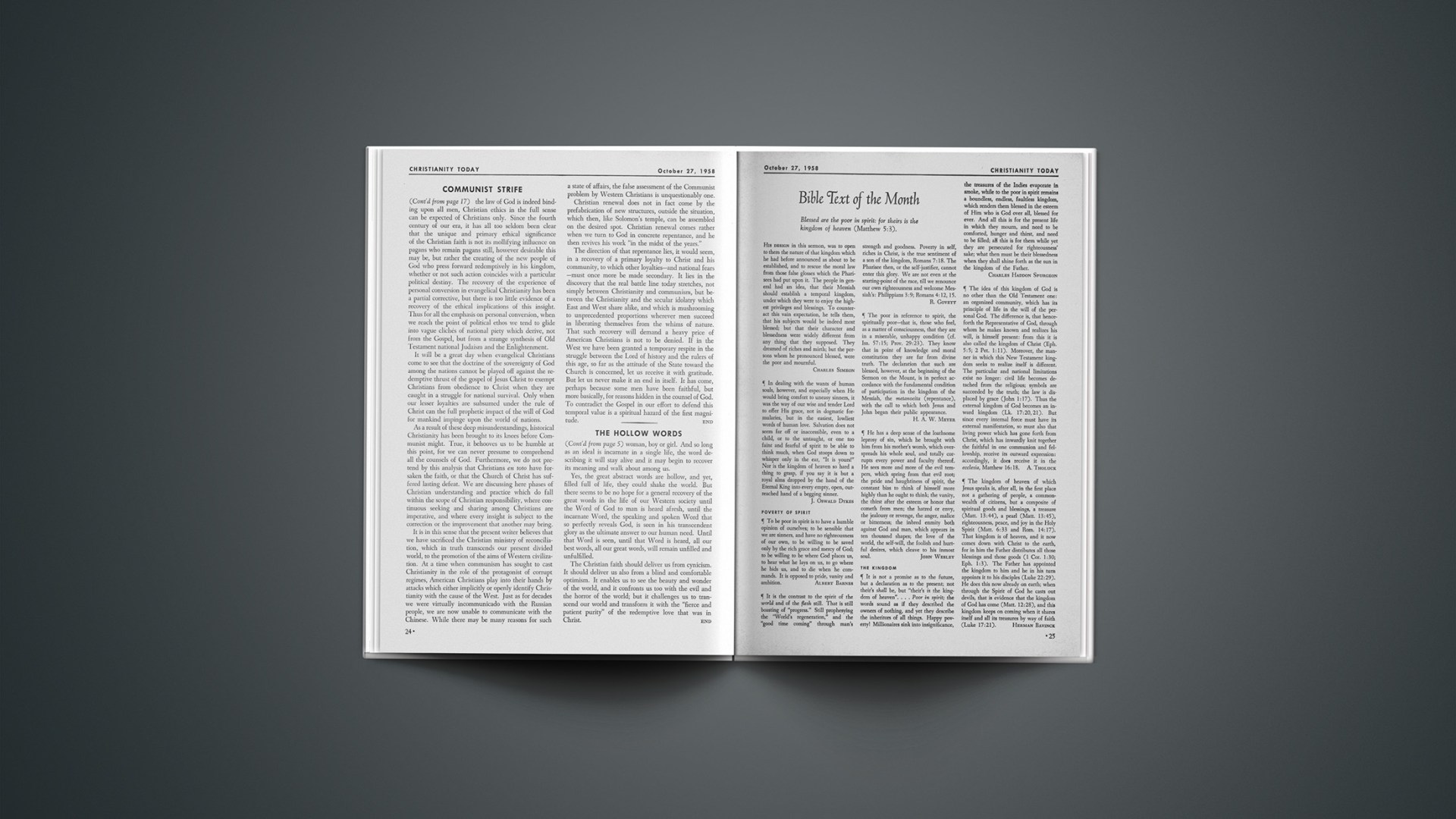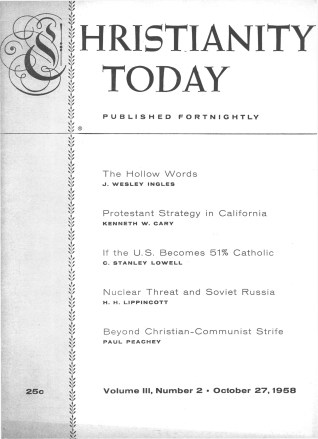Blessed are the poor in spirit: for theirs is the kingdom of heaven (Matthew 5:3).
His design in this sermon, was to open to them the nature of that kingdom which he had before announced as about to be established, and to rescue the moral law from those false glosses which the Pharisees had put upon it. The people in general had an idea, that their Messiah should establish a temporal kingdom, under which they were to enjoy the highest privileges and blessings. To counteract this vain expectation, he tells them, that his subjects would be indeed most blessed; but that their character and blessedness were widely different from any thing that they supposed. They dreamed of riches and mirth; but the persons whom he pronounced blessed, were the poor and mournful.
In dealing with the wants of human souls, however, and especially when He would bring comfort to uneasy sinners, it was the way of our wise and tender Lord to offer His grace, not in dogmatic formularies, but in the easiest, lowliest words of human love. Salvation does not seem far off or inaccessible, even to a child, or to the untaught, or one too faint and fearful of spirit to be able to think much, when God stoops down to whisper only in the ear, “It is yours!” Nor is the kingdom of heaven so hard a thing to grasp, if you say it is but a royal alms dropped by the hand of the Eternal King into every empty, open, out-reached hand of a begging sinner.
Poverty Of Spirit
To be poor in spirit is to have a humble opinion of ourselves; to be sensible that we are sinners, and have no righteousness of our own, to be willing to be saved only by the rich grace and mercy of God; to be willing to be where God places us, to hear what he lays on us, to go where he bids us, and to die when he commands. It is opposed to pride, vanity and ambition.
ALBERT BARNES
It is the contrast to the spirit of the world and of the flesh still. That is still boasting of “progress.” Still prophesying the “World’s regeneration,” and the “good time coming” through man’s strength and goodness. Poverty in self, riches in Christ, is the true sentiment of a son of the kingdom, Romans 7:18. The Pharisee then, or the self-justifier, cannot enter this glory. We are not even at the starting-point of the race, till we renounce our own righteousness and welcome Messiah’s: Philippians 3:9; Romans 4:12, 15.
R. GOVETT
The poor in reference to spirit, the spiritually poor—that is, those who feel, as a matter of consciousness, that they are in a miserable, unhappy condition (cf. Isa. 57:15; Prov. 29:23). They know that in point of knowledge and moral constitution they are far from divine truth. The declaration that such are blessed, however, at the beginning of the Sermon on the Mount, is in perfect accordance with the fundamental condition of participation in the kingdom of the Messiah, the metanoeita (repentance), with the call to which both Jesus and John began their public appearance.
H. A. W. MEYER
He has a deep sense of the loathsome leprosy of sin, which he brought with him from his mother’s womb, which overspreads his whole soul, and totally corrupts every power and faculty thereof. He sees more and more of the evil tempers, which spring from that evil root; the pride and haughtiness of spirit, the constant bias to think of himself more highly than he ought to think; the vanity, the thirst after the esteem or honor that cometh from men; the hatred or envy, the jealousy or revenge, the anger, malice or bitterness; the inbred enmity both against God and man, which appears in ten thousand shapes; the love of the world, the self-will, the foolish and hurtful desires, which cleave to his inmost soul.
JOHN WESLEY
The Kingdom
It is not a promise as to the future, but a declaration as to the present; not their’s shall be, but “their’s is the kingdom of heaven”.… Poor in spirit; the words sound as if they described the owners of nothing, and yet they describe the inheritors of all things. Happy poverty! Millionaires sink into insignificance, the treasures of the Indies evaporate in smoke, while to the poor in spirit remains a boundless, endless, faultless kingdom, which renders them blessed in the esteem of Him who is God over all, blessed for ever. And all this is for the present life in which they mourn, and need to be comforted, hunger and thirst, and need to be filled; all this is for them while yet they are persecuted for righteousness’ sake; what then must be their blessedness when they shall shine forth as the sun in the kingdom of the Father.
CHARLES HADDON SPURGEON
The idea of this kingdom of God is no other than the Old Testament one: an organized community, which has its principle of life in the will of the personal God. The difference is, that henceforth the Representative of God, through whom he makes known and realizes his will, is himself present: from this it is also called the kingdom of Christ (Eph. 5:5; 2 Pet. 1:11). Moreover, the manner in which this New Testament kingdom seeks to realize itself is different. The particular and national limitations exist no longer: civil life becomes detached from the religious; symbols are succeeded by the truth; the law is displaced by grace (John 1:17). Thus the external kingdom of God becomes an inward kingdom (Lk. 17:20, 21). But since every internal force must have its external manifestation, so must also that living power which has gone forth from Christ, which has inwardly knit together the faithful in one communion and fellowship, receive its outward expression: accordingly, it does receive it in the ecclesia, Matthew 16:18.
A. THOLUCK
The kingdom of heaven of which Jesus speaks is, after all, in the first place not a gathering of people, a commonwealth of citizens, but a composite of spiritual goods and blessings, a treasure (Matt. 13:44), a pearl (Matt. 13:45), righteousness, peace, and joy in the Holy Spirit (Matt. 6:33 and Rom. 14:17). That kingdom is of heaven, and it now comes down with Christ to the earth, for in him the Father distributes all those blessings and those goods (1 Cor. 1:30; Eph. 1:3). The Father has appointed the kingdom to him and he in his turn appoints it to his disciples (Luke 22:29). He does this now already on earth; when through the Spirit of God he casts out devils, that is evidence that the kingdom of God has come (Matt. 12:28), and this kingdom keeps on coming when it shares itself and all its treasures by way of faith (Luke 17:21).
HERMAN BAVINCK










